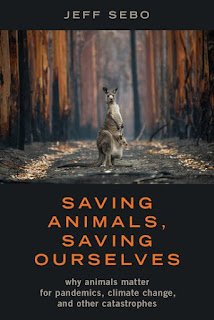 Animal Studies M.A. Program at New York University. He works primarily in bioethics, animal ethics, and environmental ethics. Sebo is co-author of Chimpanzee Rights and Food, Animals, and the Environment. He is also an executive committee member at the NYU Center for Environmental and Animal Protection, an advisory board member at the Animals in Context series at NYU Press, a board member at Minding Animals International, a mentor at Sentient Media, and a senior research affiliate at the Legal Priorities Project.
Animal Studies M.A. Program at New York University. He works primarily in bioethics, animal ethics, and environmental ethics. Sebo is co-author of Chimpanzee Rights and Food, Animals, and the Environment. He is also an executive committee member at the NYU Center for Environmental and Animal Protection, an advisory board member at the Animals in Context series at NYU Press, a board member at Minding Animals International, a mentor at Sentient Media, and a senior research affiliate at the Legal Priorities Project.
Sebo applied the “Page 99 Test” to his new book, Saving Animals, Saving Ourselves: Why Animals Matter for Pandemics, Climate Change, and other Catastrophes, and reported the following:
Here are the two full paragraphs on page 99 of Saving Animals, Saving Ourselves:Visit Jeff Sebo's website.In contrast to plant-based meat, cultivated meat is still in early stages of development. The idea has existed for at least a century, and the basic technology has existed for decades. But use of this technology to produce meat is still relatively new. In 2002, researchers announced that they made a fish filet, and in 2013 Mark Post debuted the first edible cultivated hamburger in London. Since then, many companies have worked to improve cultivated meat production methods, and they have reached important milestones in recent years. For instance, in December 2020, Singapore became the first country to grant regulatory approval for cultivated meat, and the Singaporean restaurant 1880 became the first to sell cultivated meat—in this case, “lab-grown chicken made by U.S. start-up Eat Just.”These paragraphs are part of a section that presents a positive vision for the future of food. It discusses how we can move beyond our current system of industrial animal agriculture, which causes massive and unnecessary harm to humans, animals, and the environment, and towards alternatives like plant agriculture, plant-based meat (meat made from plants), and cultivated meat (meat made from cell cultures). It also considers obstacles that might stand in the way of adopting plant-based and cultivated meat, so that we can develop these alternatives thoughtfully and strategically.
Plant-based and cultivated meat are promising alternatives to conventional meat. Production of these alternatives is more humane, healthful, and sustainable than production of conventional meat. For instance, one study predicts that cultivated meat will require only 1% as much land and 4%–18% as much water as conventional meat, and that it will emit only 4%–22% as many greenhouse gases as conventional meat. Even if these estimates are optimistic, cultivated meat is still likely to be better than conventional meat overall. Thus, while a food system based entirely around simple plants might or might not be ideal in the long run, a food system based partly around plant-based and cultivated meat might at least be a reasonable compromise in the short term, as we wean ourselves from conventional meat.
This page is not really representative of the book, mainly because the book covers too much ground for any single page (other than perhaps in the introduction or conclusion) to be representative. For instance, the book discusses why animals matter, how our use of animals contributes to pandemics and climate change, how pandemics and climate change contribute to animal suffering, how we can reduce our use of animals and increase our support for animals, and how some of our basic scientific, moral, legal, and political assumptions might be relevant to these issues.
But while this page might not be representative of the book, I like that this is the one that came up on the Page 99 Test. When we consider how inhumane, unhealthful, and unsustainable many of our current social, political, and economic systems are, it can be easy to feel pessimistic about our prospects for change. But as this page illustrates, there are many things that we can do to build a more humane, healthful, and sustainable future, and so I think that we have reason to be cautiously optimistic instead – provided that we do the work necessary to make that stance warranted.
--Marshal Zeringue



